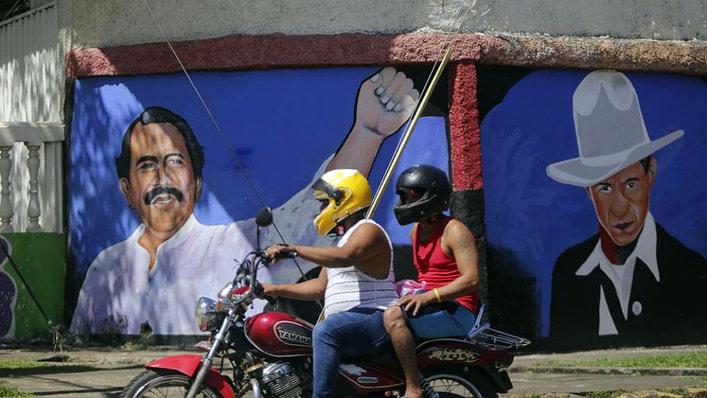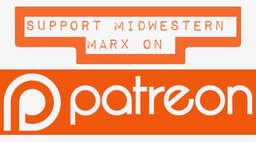|
11/10/2021 U.S. attacks on Ortega fail to convince Nicaraguan voters. By: Christian GuevaraRead NowA motorcyclist rides past a mural of Nicaraguan President Daniel Ortega, left, and revolutionary hero Cesar Augusto Sandino during general elections in Managua, Nicaragua, Sunday, Nov. 7, 2021. | Andres Nunes / AP People’s World correspondent Christian Guevara is on the scene in Nicaragua to observe the country’s general election with a delegation of the Friends of the ATC, a rural workers’ association in Nicaragua that was central to the land reform policy of the Sandinista Revolution in 1979 to distribute land to the peasants. It represents 50,000 workers from the majority of Nicaragua’s 15 departments and organizes primarily in farmer’s unions (coffee, tobacco, banana, sugarcane, and palm). MANAGUA—The United States is waging economic war against Nicaragua and the overwhelmingly popular Sandinista government here as the people of the country head to the polls. Just last week, the U.S. House of Representatives passed the RENACER Act, a slew of additional deadly sanctions, with huge bipartisan support. The U.S. also continues to make a plethora of attacks on President Daniel Ortega, who is running for a fourth term in office. Washington claims Ortega is a drug trafficker and a dictator, that he imprisoned his political opposition, and even that he has killed his own citizens. The U.S. purports to be a bastion of “freedom” and “democracy,” as a model for Nicaragua, but the opinions of the Nicaraguan people I’ve met the past week differ sharply. Comparing the U.S.’ approach to other countries in the region suggests some clear inconsistencies in the arguments being used to demonize Nicaragua’s leaders and justify the economic warfare that is at the heart of current U.S. policy toward its people. U.S. relations with the Honduran government and its president, Juan Orlando Hernández, are instructive. Following the 2009 U.S.-backed coup against progressive Honduran President Manuel Zelaya, the U.S. proudly supported a succession of right-wing governments there and turned a blind eye to blatant corruption. The brother of Hernández is currently serving a life sentence plus 30 years in a United States prison for trafficking cocaine. The connections between the current president and his drug-trafficking brother are widely known in Honduras, yet the U.S. State Department has never suggested reprimanding the narco-president, much less his country, for his blatant crimes. This is because Hernández is closely aligned with the U.S. economic and political establishment and has no qualms about continuing to allow his people to be exploited by U.S. multinational corporations and eagerly pursues devastating neoliberal policy. The Nicaragua-Honduras comparison is similar to that between Venezuela and its neighbor, Colombia. Despite ruling over a country that produces 75% of the world’s supply of cocaine, the Colombian state receives absolutely zero accusations of criminal activity from the U.S. government. Nor does it earn condemnation for the violent suppression of mass anti-government protests and the mass killing of protesters from military gunship helicopters. This is, again, because the Colombian neoliberal government is aligned with U.S. economic interests. The reason for mentioning these examples—which are widely repeated in the streets of Managua—is not to point fingers and ignore the accusations, but to illustrate the view here that U.S. accusations are hypocritical and ludicrous. The motivation behind the unsubstantiated accusations against their country by Washington is quite obvious to Nicaraguans. President Daniel Ortega does not fall in line with U.S. economic interests—which would still prefer to see Nicaragua be a neo-colony where U.S. companies can exploit low-wage workers and destroy the environment for profit. The U.S. State Department and mainstream corporate media have been in a frenzy over the past year, blowing up accusations of “political prisoners” in Nicaragua—accusations that local Nicaraguans find laughable. The most famous of these “political prisoners” is Cristiana Chamorro, an extravagantly wealthy Nicaraguan oligarch and owner of right-wing news outlet La Prensa. Chamorro has a long history with Ortega’s party, the Sandinista Front for National Liberation Front (FSLN). During the Contra War of the late 1970s and into the ’80s, La Prensa was funded by the CIA and used as a tool for the U.S. government to spread propaganda to undermine Ortega when he was president then. Before that, the U.S. also supported and funded dictator Anastasio Somoza’s terrorist war on the Nicaraguans that killed over 80,000 people. Nowadays, La Prensa is not funded by the CIA, as far as is known. It is, however, funded by the National Endowment for Democracy, a U.S. front group created to destabilize anti-imperialist governments and impose the U.S.’ political will on poor countries. Despite the ridiculous lies of Nicaraguan business and corporate media, Chamorro is not imprisoned for being an “opposition candidate.” Interestingly, she was never even officially running for president—even U.S. news outlets have used the phrase “pre-candidate” to describe her “campaign.” Chamorro’s problems with the legal system long pre-date the current election, however. She was caught laundering money from Nicaraguan non-profits and using the funds (as well as U.S. money) to attempt a coup in 2018 that led to the deaths of over 300 people, the majority of whom were Sandinista supporters. These details seem to have been missed by the U.S. State Department and “accredited” news outlets. As for the accusation that Ortega is a dictator, the charge is a common one made against any leader that doesn’t fall in line with U.S. hegemony, especially those who enjoy mass support from their own people. Despite having the overwhelming support of the Nicaraguan people (estimated to be 60-70% in pre-election polls), Ortega is accused of “cracking down” on the very same democratic institutions that were established by the FSLN in 1984. For the U.S., it may very well seem impossible for a leader to have the kind of support Ortega has in Nicaragua. But just maybe he has that support because he has followed through with his political promises and drastically improved the lives of Nicaraguans, with policies like:
These are the crimes of the FSLN. They are also among the reasons why the United States is trying to destroy the Nicaraguan government by making its people suffer through sanctions. But the FSLN has been through this kind of economic war before, and for years it’s been preparing alternatives for its citizens to live without the need for U.S. trade. Managua campesino, Victorio Potosme, provided the general view among farmers and people here: “No country benefits from sanctions, but despite all the sanctions and struggles, our government has been able to work through it. We have lived for many years under sanctions. During the times of the war, we lived during extremely harsh sanctions. Governments should not get involved in the issues of other countries. We as farmers in Nicaragua don’t get involved in the farmers’ issues in the U.S. We receive guests in Nicaragua with no discrimination. We welcome Americans and their politicians to our country. They can come and visit and do as they please. That is because we do have freedom, not the lie of liberal freedom. But they do not treat us with the same respect. American leaders want the freedom to come to our country, rob our people, and exploit us. That is the “freedom” American politicians want. Our spirit is strong. Stronger than sanctions. We are not worried about sanctions. We will continue to improve, sanctions or no sanctions.” AuthorChristian Guevara is an active member of the D.C. Metro Communist Party USA, Claudia Jones School for Political Education, and the Committee in Solidarity with the People of El Salvador (CISPES). This article was produced by People's World. Archives November 2021
1 Comment
RR
11/12/2021 01:04:17 am
Paxton Smith, a valedictorian at a Texas high school, abandoned her prepared speech earlier this year to criticise the state’s extreme abortion ban. She and many other women would likely diagree with the author of this piece. Recall, Ortega was returned to power in 2007 as the Catholic president of Nicaragua. The elephant in the room is. of course, abortion. Nicaragua is one of six countries in the world where abortion is totally illegal. And still some claim that the empowerment of women in Nicaragua has been achieved!
Reply
Leave a Reply. |
Details
Archives
July 2024
Categories
All
|


 RSS Feed
RSS Feed